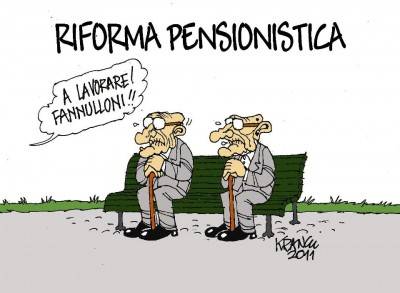Government, Unions Battle Over Boosting Age for Pensions
As if Premier Paolo Gentiloni hasn't enough problems, this autumn his more-or-less center-left government is at loggerheads with the trade unions over raising the pensionable age for workers to 67 years by 2019. Justification for the rise is the increased longevity of Italians, which means that, at an ever higher cost to the government, retirees, beginning with teachers and civil servants, are to receive pensions for many more years than in the past.
The unions are demanding that the government back-pedal on the pensionable age, but this would automatically cost the state significantly more. Forty years ago the average Italian died at age 65, but today's lives on the average for 82,8 years, a figure that rose by 0,4% in just the past two years. Women outlive the men (85 years vis à vis 80.6 years). A pragmatic sign of the healthier times: the sheer number of the deceased declined by 32,000 since 2015.
Besides increased longevity, the government position reflects other real problems. If the government is seen as backsliding due to union demands for relatively earlier retirement, international markets may show negative reactions.
In the government's plan, the 15,000 to 20,000 workers with heaviest duties, such as firemen and construction workers, would be allowed earlier retirement if they have worked on that level of stress for at least seven out of the previous 10 years before retirement.
The final results must be included in the annual budget bill, which the government is seeking to pass as soon as possible. For this reason representatives of the big three unions, Susanna Camusso, Annamaria Furlan and Carmelo Barbagallo, were meeting at Palazzo Chigi with Gentiloni himself and with Economics Minister Pier Carlo Padoan and Labor Minister Giuliano Poletti.
So far the unions, beginning with the leftist CGIL, reject the government proposal on grounds that the number of workers with jobs requiring heavy physical labor has been seriously underestimated.. In the meantime the government has backtracked if only slightly, suggesting that the pensionable age be set at 66 years and 11 months, or just one month less than in the current proposal.
One of the controversial questions is how to evaluate which jobs are particularly physically and mentally stressful. Is teaching primary school one of these? So far no one know. Last week hearings on the issue took place in the Senate, where Giorgio Alleva, president of the Italian statistics-gathering agency ISTAT, testified that, "This is a theme we have to face but that still requires research." Even as a task force "scientific commission" is seeking to analyze just which jobs are involved, Alleva points out that "it is not enough just to establish [work] categories -- the individual work career over time for heavy labor is to be considered."
Even as these traditional problems weigh on the agenda (and the pocketbook), the Italian workplace itself is changing. The newest wrinkle is to encourage white collar workers to work from home, perhaps a day or two a week (or more), via computer, mobile phone and office meetings on skype. "It is a change in the culture, associated with many other benefits," writes Patrizia Capua in the economics weekly of La Repubblica. Managers praise this for giving their organizations greater flexibility.
Modern communications, including blogging, give CEO's far greater possibilities of being in touch with their entire group than in the past, according to Claudio Feser, a partner with McKinsey & Co. Even governmental organizations are taking this on board with experimental work-at-home programs underway in the Piedmont Region and in City Hall in Turin. "Smart working," as the Italians also call it, programs are already adopted by financial companies and some travel agencies in Rome.






































i-Italy
Facebook
Google+
This work may not be reproduced, in whole or in part, without prior written permission.
Questo lavoro non può essere riprodotto, in tutto o in parte, senza permesso scritto.